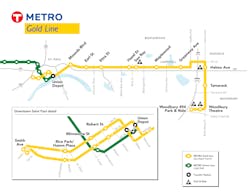FTA gives environmental clearance to Minnesota Metro Transit BRT project
The planned Metro Transit Gold Line bus rapid transit project cleared a key federal environmental hurdle, but still needs clearances from the state and a second federal agency before Twin Cities commuters will see service.
The Federal Transit Administration (FTA) issued a Finding of No Significant Impact for the project that will connect Woodbury, Oakdale, Maplewood and Landfall to downtown Saint Paul, Minn. This is the first environmental requirement that the Gold Line project needed to move forward since entering the Federal Capital Investment Grant program, which could fund up to 45 percent of the project’s cost. Stakeholders said the project will submit its environmental report and the environmental decision document later this year to the Federal Highway Administration and the Minnesota Environmental Quality Board for review because of potential impacts to Interstate 94 and to ensure the project abides by state environmental laws.
“A successful transit project has to fit into the community it serves as seamlessly as possible,” said Metropolitan Council Chair Charlie Zelle. “We want to make sure the Gold Line improves the quality of life for people along the line. Bus rapid transit service like the Gold Line provides important community connections, and we’re pleased at the progress this project is making to bring this great option to people in the east metro.”
The environmental assessment was carried out in partnership with both Washington and Ramsey counties, which have committed to matching local funds for the project, and all five cities the project will serve, as well as the Federal Highway Administration, U.S. Army Corps of Engineers, U.S. Fish and Wildlife Service, the Minnesota Department of Transportation and the Minnesota State Historic Preservation Office. In addition, project staff connected with more than 2,000 community members in-person through individual and public meetings and events along the line.
“Any environmental assessment process is a big undertaking,” said Gold Line Project Manager Christine Beckwith. “We worked closely with partners to obtain the feedback and input necessary to move the project forward, and we did it on schedule.”
This spring, the public will have more opportunities to attend neighborhood meetings to view the current plans, ask questions and make additional comments. By the end of the year, Beckwith expects 60 percent of the design work to be complete and new rounds of public meetings to be held.
The planned 10-mile, dedicated bus rapid transit line is expected to begin service in 2024.

Mischa Wanek-Libman | Group Editorial Director
Mischa Wanek-Libman is director of communications with Transdev North America. She has more than 20 years of experience working in the transportation industry covering construction projects, engineering challenges, transit and rail operations and best practices.
Wanek-Libman has held top editorial positions at freight rail and public transportation business-to-business publications including as editor-in-chief and editorial director of Mass Transit from 2018-2024. She has been recognized for editorial excellence through her individual work, as well as for collaborative content.
She is an active member of the American Public Transportation Association's Marketing and Communications Committee and served 14 years as a Board Observer on the National Railroad Construction and Maintenance Association (NRC) Board of Directors.
She is a graduate of Drake University in Des Moines, Iowa, where she earned a Bachelor of Arts degree in Journalism and Mass Communication.

